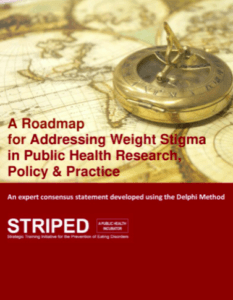 Weight stigma and the discrimination it is used to justify are common, negatively impact the health of all people, and are particularly harmful for those living in larger bodies. Experiencing weight stigma contributes to depression, anxiety, and suicidality. Weight stigma in healthcare and physical activity settings impedes access to these settings, leading to their avoidance. Weight stigma also creates the conditions that render people vulnerable to exploitative marketing tactics. For example, marketing of tobacco, diet products, and highly processed foods with low nutritional value is designed to drive up profits while driving down the health of struggling communities.
Weight stigma and the discrimination it is used to justify are common, negatively impact the health of all people, and are particularly harmful for those living in larger bodies. Experiencing weight stigma contributes to depression, anxiety, and suicidality. Weight stigma in healthcare and physical activity settings impedes access to these settings, leading to their avoidance. Weight stigma also creates the conditions that render people vulnerable to exploitative marketing tactics. For example, marketing of tobacco, diet products, and highly processed foods with low nutritional value is designed to drive up profits while driving down the health of struggling communities.
Weight stigma is also significant risk factor for eating disorders. The more a person takes negative messages about body weight to heart, the more likely they are to develop an eating disorder, regardless of how much that person weighs. Stigmatizing messages about body weight come from mass media, educators, bullies at school, fitness professionals, prospective employers, landlords, and businesses. And they can also come from public health and healthcare professionals.
As a public health initiative, STRIPED is committed to working toward putting an end to weight stigma. To address weight stigma in public health research, policy, and practice, we conducted a Delphi expert consensus study with a group of panelists (or experts) from the fields of eating disorders, fat activism, and public health to identify ideas and actions supported by high levels of consensus across fields.
DOWNLOAD OUR ROADMAP HERE: STRIPED Roadmap



